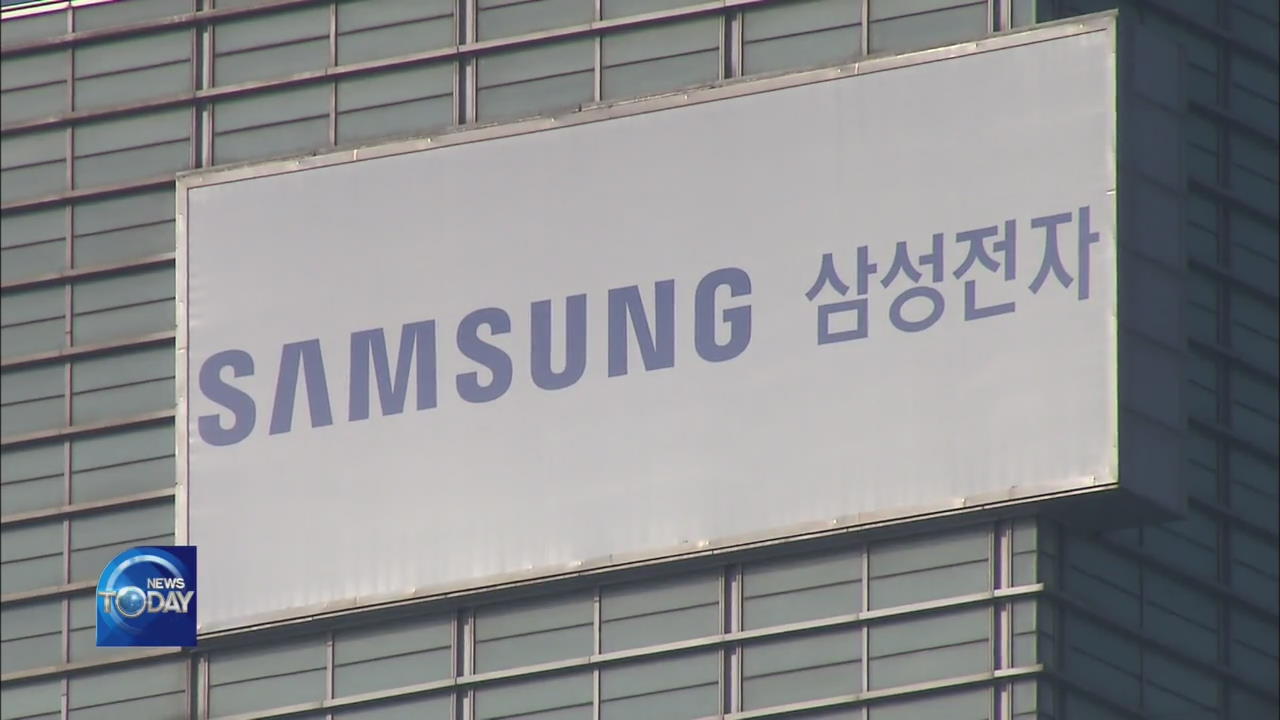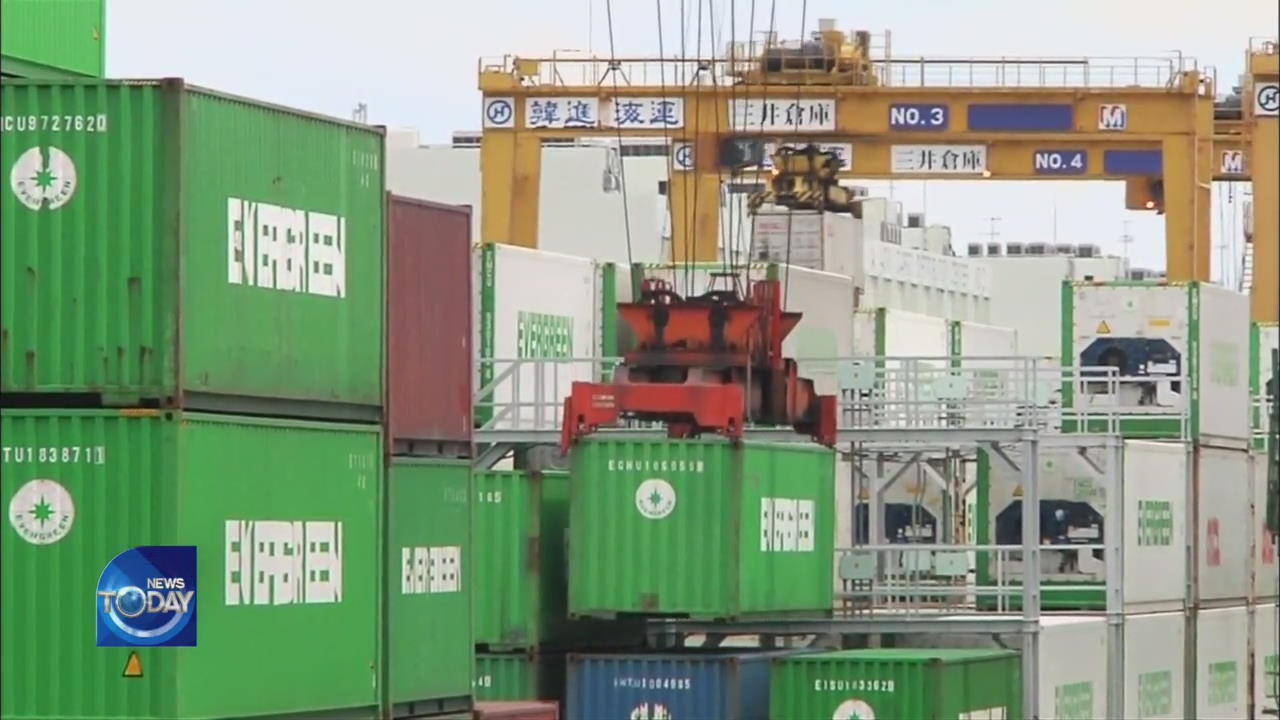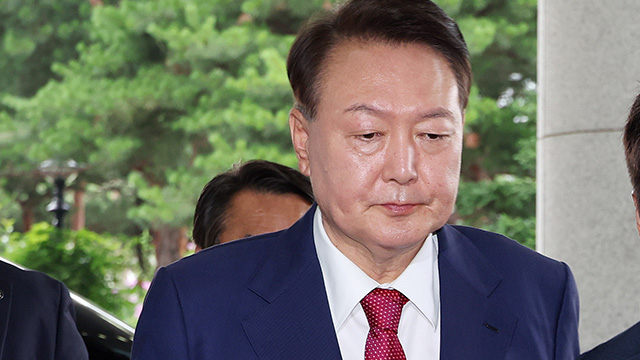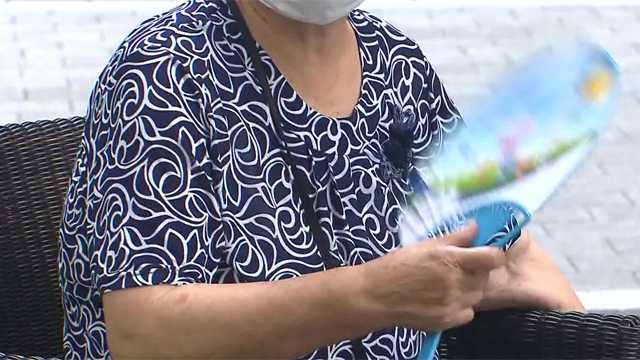COUNTERMEASURES TO EXPORT RESTRICTIONS
입력 2019.07.08 (15:04)
수정 2019.07.08 (16:46)
읽어주기 기능은 크롬기반의
브라우저에서만 사용하실 수 있습니다.
[Anchor Lead]
Meanwhile the Korean government is scrambling to find solutions to Japan's export restrictions, but the Korean non-memory semiconductor industry stands to receive quite a blow. Korea has come up with mid-term plans, such as localizing key materials, but that may not be enough to avert immediate damage to the country's future growth engine.
[Pkg]
Last April, Samsung Electronics reported its worst first-quarter performance. At that time, the IT giant announced that it will seek a new growth capability in the non-memory semiconductor sector. On the same day, the government announced its plan to promote the system semiconductor business and pledged to subsidize semiconductor fabrication projects and the foundry sector.
[Soundbite] PRES. MOON JAE-IN(APR. 30) : "Samsung Electronics announced its bold plan to invest KRW 13.3 tn and jump to 1st place in the foundry sector. The government will offer its eager assistance."
But if Japan does not lift its export restrictions, Samsung's plan to become the world's number one foundry business will be disrupted. That's because photoresist, one of the materials on Japan's restriction list, is key to Samsung's 7 nano process. It's not easy to find a replacement since Japanese businesses dominate 90% of the world market and over 90% of the Korean businesses' demands are met by this material from Japan.
[Soundbite] LEE JONG-HO(DIR., INTER-UNIVERSITY SEMICONDUCTOR RESEARCH CENTER) : "Photoresist is the key material that determines the fate of the foundry industry. If it's not supplied for an extended time, it may delay or make it impossible to reach the goal."
Japan also has 90% of the world market share on fluoride polyimide and a 70% share on the highly toxic hydrogen fluoride. As Tokyo seems poised to expand its retaliatory export measures, Seoul has decided to support the localization of items with heavy dependence on imports. The government will subsidize the manufacturing of production-ready technologies and increase R&D investment on the technologies ready for commercialization by jointly conducting substantive tests with corporations. Such countermeasures are expected to make Korea's industrial structure stronger in the long run, but diplomatic solutions are needed to soften the immediate and certain blows to the country's high-tech industry.
Meanwhile the Korean government is scrambling to find solutions to Japan's export restrictions, but the Korean non-memory semiconductor industry stands to receive quite a blow. Korea has come up with mid-term plans, such as localizing key materials, but that may not be enough to avert immediate damage to the country's future growth engine.
[Pkg]
Last April, Samsung Electronics reported its worst first-quarter performance. At that time, the IT giant announced that it will seek a new growth capability in the non-memory semiconductor sector. On the same day, the government announced its plan to promote the system semiconductor business and pledged to subsidize semiconductor fabrication projects and the foundry sector.
[Soundbite] PRES. MOON JAE-IN(APR. 30) : "Samsung Electronics announced its bold plan to invest KRW 13.3 tn and jump to 1st place in the foundry sector. The government will offer its eager assistance."
But if Japan does not lift its export restrictions, Samsung's plan to become the world's number one foundry business will be disrupted. That's because photoresist, one of the materials on Japan's restriction list, is key to Samsung's 7 nano process. It's not easy to find a replacement since Japanese businesses dominate 90% of the world market and over 90% of the Korean businesses' demands are met by this material from Japan.
[Soundbite] LEE JONG-HO(DIR., INTER-UNIVERSITY SEMICONDUCTOR RESEARCH CENTER) : "Photoresist is the key material that determines the fate of the foundry industry. If it's not supplied for an extended time, it may delay or make it impossible to reach the goal."
Japan also has 90% of the world market share on fluoride polyimide and a 70% share on the highly toxic hydrogen fluoride. As Tokyo seems poised to expand its retaliatory export measures, Seoul has decided to support the localization of items with heavy dependence on imports. The government will subsidize the manufacturing of production-ready technologies and increase R&D investment on the technologies ready for commercialization by jointly conducting substantive tests with corporations. Such countermeasures are expected to make Korea's industrial structure stronger in the long run, but diplomatic solutions are needed to soften the immediate and certain blows to the country's high-tech industry.
■ 제보하기
▷ 카카오톡 : 'KBS제보' 검색, 채널 추가
▷ 전화 : 02-781-1234, 4444
▷ 이메일 : kbs1234@kbs.co.kr
▷ 유튜브, 네이버, 카카오에서도 KBS뉴스를 구독해주세요!
- COUNTERMEASURES TO EXPORT RESTRICTIONS
-
- 입력 2019-07-08 15:08:11
- 수정2019-07-08 16:46:30

[Anchor Lead]
Meanwhile the Korean government is scrambling to find solutions to Japan's export restrictions, but the Korean non-memory semiconductor industry stands to receive quite a blow. Korea has come up with mid-term plans, such as localizing key materials, but that may not be enough to avert immediate damage to the country's future growth engine.
[Pkg]
Last April, Samsung Electronics reported its worst first-quarter performance. At that time, the IT giant announced that it will seek a new growth capability in the non-memory semiconductor sector. On the same day, the government announced its plan to promote the system semiconductor business and pledged to subsidize semiconductor fabrication projects and the foundry sector.
[Soundbite] PRES. MOON JAE-IN(APR. 30) : "Samsung Electronics announced its bold plan to invest KRW 13.3 tn and jump to 1st place in the foundry sector. The government will offer its eager assistance."
But if Japan does not lift its export restrictions, Samsung's plan to become the world's number one foundry business will be disrupted. That's because photoresist, one of the materials on Japan's restriction list, is key to Samsung's 7 nano process. It's not easy to find a replacement since Japanese businesses dominate 90% of the world market and over 90% of the Korean businesses' demands are met by this material from Japan.
[Soundbite] LEE JONG-HO(DIR., INTER-UNIVERSITY SEMICONDUCTOR RESEARCH CENTER) : "Photoresist is the key material that determines the fate of the foundry industry. If it's not supplied for an extended time, it may delay or make it impossible to reach the goal."
Japan also has 90% of the world market share on fluoride polyimide and a 70% share on the highly toxic hydrogen fluoride. As Tokyo seems poised to expand its retaliatory export measures, Seoul has decided to support the localization of items with heavy dependence on imports. The government will subsidize the manufacturing of production-ready technologies and increase R&D investment on the technologies ready for commercialization by jointly conducting substantive tests with corporations. Such countermeasures are expected to make Korea's industrial structure stronger in the long run, but diplomatic solutions are needed to soften the immediate and certain blows to the country's high-tech industry.
Meanwhile the Korean government is scrambling to find solutions to Japan's export restrictions, but the Korean non-memory semiconductor industry stands to receive quite a blow. Korea has come up with mid-term plans, such as localizing key materials, but that may not be enough to avert immediate damage to the country's future growth engine.
[Pkg]
Last April, Samsung Electronics reported its worst first-quarter performance. At that time, the IT giant announced that it will seek a new growth capability in the non-memory semiconductor sector. On the same day, the government announced its plan to promote the system semiconductor business and pledged to subsidize semiconductor fabrication projects and the foundry sector.
[Soundbite] PRES. MOON JAE-IN(APR. 30) : "Samsung Electronics announced its bold plan to invest KRW 13.3 tn and jump to 1st place in the foundry sector. The government will offer its eager assistance."
But if Japan does not lift its export restrictions, Samsung's plan to become the world's number one foundry business will be disrupted. That's because photoresist, one of the materials on Japan's restriction list, is key to Samsung's 7 nano process. It's not easy to find a replacement since Japanese businesses dominate 90% of the world market and over 90% of the Korean businesses' demands are met by this material from Japan.
[Soundbite] LEE JONG-HO(DIR., INTER-UNIVERSITY SEMICONDUCTOR RESEARCH CENTER) : "Photoresist is the key material that determines the fate of the foundry industry. If it's not supplied for an extended time, it may delay or make it impossible to reach the goal."
Japan also has 90% of the world market share on fluoride polyimide and a 70% share on the highly toxic hydrogen fluoride. As Tokyo seems poised to expand its retaliatory export measures, Seoul has decided to support the localization of items with heavy dependence on imports. The government will subsidize the manufacturing of production-ready technologies and increase R&D investment on the technologies ready for commercialization by jointly conducting substantive tests with corporations. Such countermeasures are expected to make Korea's industrial structure stronger in the long run, but diplomatic solutions are needed to soften the immediate and certain blows to the country's high-tech industry.
이 기사가 좋으셨다면
-
좋아요
0
-
응원해요
0
-
후속 원해요
0















![[단독] 대통령실 국정상황실 파견 총경급 인사 문책성 복귀](/data/layer/904/2025/07/20250707_q2dg0Q.jpg)

이 기사에 대한 의견을 남겨주세요.